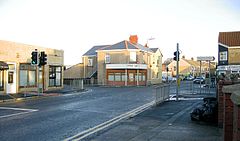Loughor
Loughor
|
|
|---|---|
 |
|
| Loughor shown within Swansea | |
| Population | 4,991 (2001 Census) |
| OS grid reference | SS573980 |
| Principal area | |
| Ceremonial county | |
| Country | Wales |
| Sovereign state | United Kingdom |
| Post town | SWANSEA |
| Postcode district | SA4 |
| Dialling code | 01792 |
| Police | South Wales |
| Fire | Mid and West Wales |
| Ambulance | Welsh |
| EU Parliament | Wales |
| UK Parliament | |
Loughor (/ˈlʌxər/) (Welsh: Casllwchwr) is a town in the City and County of Swansea, Wales, within the historic county boundaries of Glamorgan, Wales. It lies on the estuary of the River Loughor. The town has a community council called Llwchwr. In 2014, it was rated one of the most attractive postcode areas to live in Wales.
The town was home to the Roman fort of Leucarum, over which the Norman Loughor Castle was built in 1106. Loughor developed around the castle.
The town has an Independent Lifeboat station situated near the road bridge which has been in existence since 1969. The current Lifeboat is a state of the art Ribcraft 5.85 metre Rhib.
It later grew as a port, while in the early twentieth century large tin and steel works were the main industries. Around 1800, John Vivian (1750–1826) of Truro, Cornwall, had become managing partner in the copper works at Penclawdd and Loughor then owned by the Cheadle Brasswire Company of Staffordshire. The Vivian family eventually ran large copper mining, copper smelting and trading businesses in and around Swansea (Vivian & Sons) and, throughout the 19th century, did much to develop Swansea into a city.
...
Wikipedia

